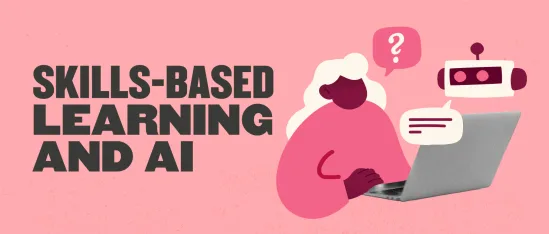Skills-based learning isn’t new. But right now, it’s more important than ever.
As HR leaders, we’re under increasing pressure to help our businesses move faster, adapt quicker, and scale smarter. Traditional roles and rigid hierarchies are giving way to agile, project-based work. In this world, what really matters is not what your job title is, but what you can do.
We need to understand our people more deeply. What skills do they already bring to the table? Where are the gaps? And how do we help our teams build the capabilities they’ll need for whatever comes next?
This is where skills-based learning comes in—not as a buzzword, but as a practical, people-first approach to building the kind of organizations that can thrive in the age of AI. Let’s reframe the conversation.
Why skills-based learning matters more now than ever
In today’s dynamic, cross-functional environments, agility isn’t a nice-to-have—it’s essential. Organizations are constantly adapting, whether it’s to new markets, emerging technologies, or shifting customer needs.
At HiBob, we’ve experienced this firsthand. As our company has grown, so has the complexity of our work. For example, we’re no longer just working with HR personas—now we’re engaging more with finance and IT leaders, which has required our teams to develop entirely new communication and collaboration skills.
This shift highlights the importance of having visibility into your existing skills across the business. It’s not enough to know who does what on paper—you need to know what they’re really capable of. That insight helps you mobilize talent more effectively, identify development needs, and make smarter hiring decisions.
And crucially, it allows you to stay flexible. When you understand your people’s skills, you can build more adaptable teams, match talent to evolving business needs, and stay ahead of change. That’s where AI enters the picture.
AI: From disruptor to enabler
For many, AI can feel overwhelming, especially in HR, where much of our work is relational and human in nature. But at HiBob, we’ve started shifting the narrative. Instead of asking, “Will AI replace me?”, we’re encouraging everyone to ask, “How can AI help me do this better?”
That mindset change has been powerful across every team in the organization. From the People team, I can provide a specific example of how AI is helping us succeed. With a growing global team, the volume of feedback we receive from our engagement surveys has exploded.
Previously, our team would spend hours manually reviewing comments, topics, and themes. Now, we use AI tools to quickly analyze the data—identifying sentiment, spotting trends, and highlighting key focus areas.
The result? Our teams have more time to do what matters: partnering with leaders, designing action plans, and spending time with our people. AI hasn’t taken away the human element; it’s enhanced it and given us more time to focus on the important things. We still validate our findings, add context, and bring empathy to the conversation. But AI gives us a stronger foundation to build from.
And this kind of enablement isn’t limited to HR. We’re encouraging everyone across the business to adopt the same mindset: If you’re spending a lot of time doing something repetitive or admin-heavy, ask whether AI could help.
That question alone can unlock new efficiencies and free up space for the kind of work only people can do. This brings us to a key insight: not all skills are technical. In fact, many of the most valuable ones happen through experience.
Real-world learning happens on the job
At HiBob, we base our learning approach on the 70/20/10 model: 70 percent of learning occurs through on-the-job experiences, 20 percent through relationships and mentoring, and 10 percent through formal training.
That means development isn’t limited to workshops or e-learning modules. It’s woven into the everyday—through the projects you’re pulled into, the teams you collaborate with, and the feedback you receive from peers and managers.
Managers play a huge role here. They’re often the ones spotting opportunities, assigning stretch projects, and guiding people toward new experiences. Whether it’s assigning someone to take responsibility for learning and teaching a new skill within their team or encouraging a team member to lead a cross-functional initiative, these moments create real, lasting growth.
Learning also looks different depending on the skill. Some topics may require structured content, but other skills—such as navigating change, influencing stakeholders, or managing global communication—are best learned through hands-on experience.
That’s why we focus on building a culture where learning is part of the flow of work. And no group has more fully embraced this mindset shift than Gen Z.
Gen Z is changing the game
If there’s one generation pushing us to rethink learning and development, it’s Gen Z.
They care deeply about growth and purpose, but not necessarily in the traditional, linear sense. We’ve seen this play out at HiBob through an increase in lateral moves and unconventional career transitions. People are switching departments, exploring new roles, and bringing their skills to entirely different parts of the business.
It’s not about climbing a ladder. It’s about building a portfolio of experiences. Gen Z wants to learn, contribute, and be stretched, and they’re doing it on their own terms.
They’re also incredibly tech-savvy. They don’t wait for formal instruction to try something new. Instead, they’ll jump on YouTube, chat with peers, or just start experimenting. This makes them natural early adopters of tools like AI.
As HR leaders, we can harness this energy. By giving Gen Z space to experiment, share their insights, and mentor others, we create a ripple effect of curiosity and innovation across the business. However, this kind of environment doesn’t just benefit Gen Z; it supports everyone, and it’s key to driving both retention and performance.
Skills-based learning = retention + performance
People stay where they feel seen, supported, and challenged. When people can connect their growth to business outcomes—and when they know their development matters to the company—they’re more engaged, more motivated, and more likely to stay.
Skills-based learning helps make that connection clear. It enables better conversations about career paths, supports meaningful internal mobility, and makes it easier to match people to the work they’re best suited for.
It also supports performance. When people are equipped with the right skills—whether technical, relational, or strategic—they make better decisions, collaborate more effectively, and drive better results. But this doesn’t happen by accident. Development is a shared responsibility.
As HR, we can build the frameworks. We can provide the tools, create the programs, and open up the opportunities. But people need to own their growth. They need to raise their hands, reflect on what they want to learn, and take advantage of what’s available.
When both sides show up, that’s where the magic happens. So what does this look like in practice? It starts with mindset.
Recommended For Further Reading
A future-ready mindset for HR
The most important shift we can make right now isn’t just about technology—it’s about how we think.
At HiBob, we’ve introduced “AI champions” in every team to create space for exploration, experimentation, and shared learning. But more broadly, we’re nurturing a culture of curiosity. We want people to ask, “How could we do this differently?” or “What haven’t we tried yet?”
While AI is a big part of that, so are the human skills that help us navigate complexity: empathy, cultural awareness, and adaptability. As we grow into new regions and work across different time zones, these skills are becoming more essential. People need to know how to communicate effectively across cultures, adapt their tone for different audiences, and build relationships that transcend distance and differences.
That’s the heart of future-ready HR. It’s not about having all the answers—it’s about creating the conditions for your people to keep asking the right questions.
Let’s rethink what learning looks like
The world of work is evolving, and with it, the way we think about learning and development. As HR leaders, we’re not just responding to these changes. We’re in a unique position to lead them.
By embracing skills-based learning, leveraging AI as an enabler, and supporting every person’s potential, we can help our organizations adapt, thrive, and build a better future of work.
Let’s keep learning. Let’s keep asking questions. And let’s keep building teams that are ready for whatever comes next.


